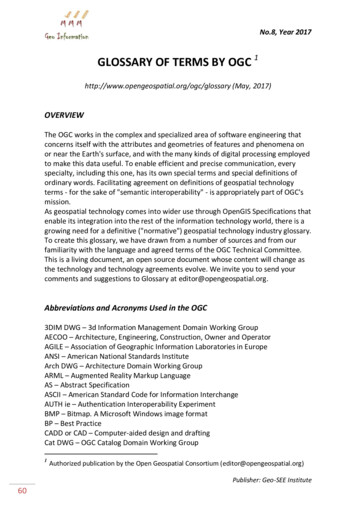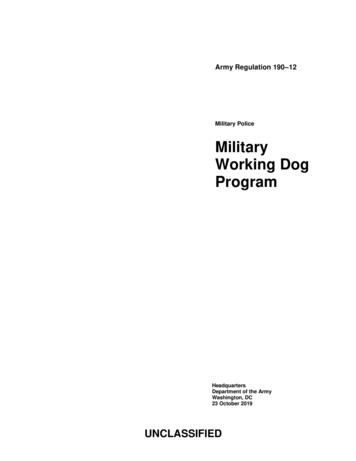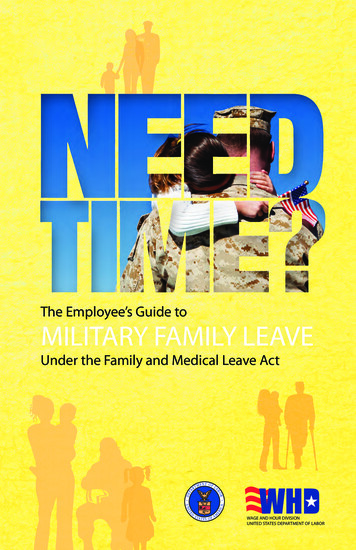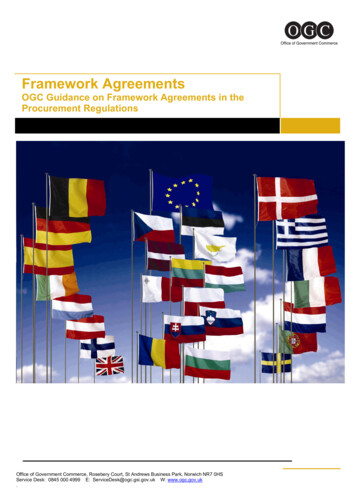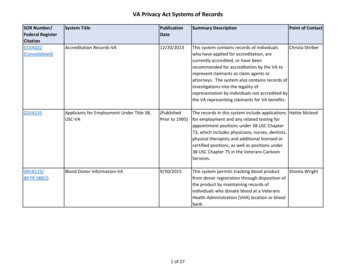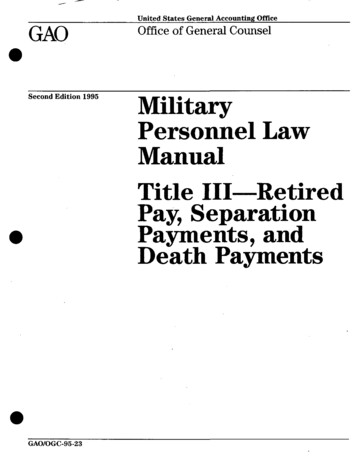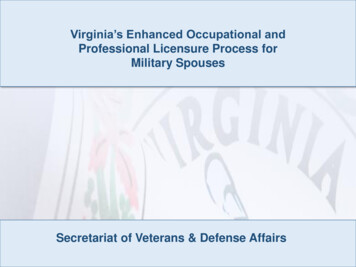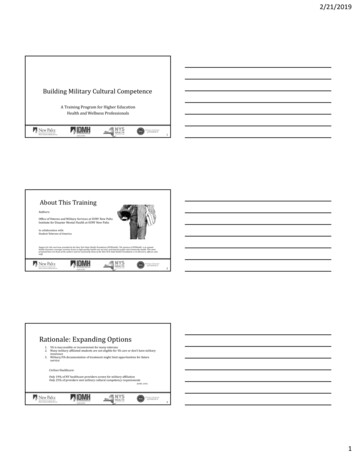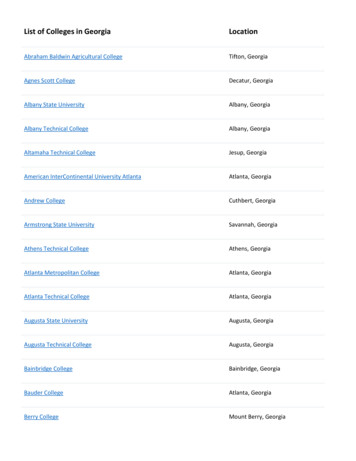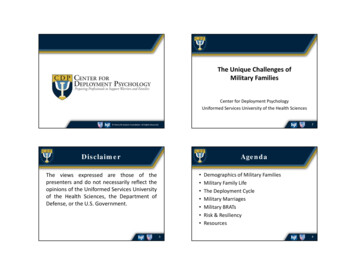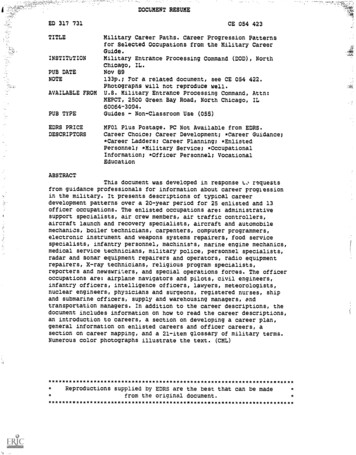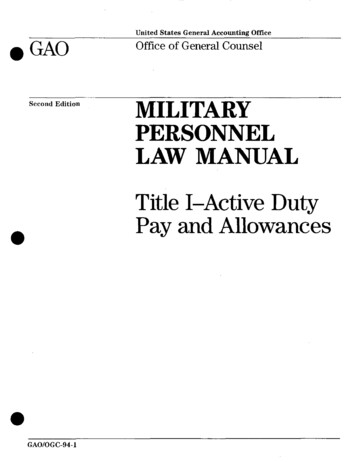
Transcription
United States General Accounting OfficeGAOOffice of General CounselSecond EditionMILITARYPERSONNELLAW MANUALTitle I-Active DutyPay and AllowancesGAO/OGC-94-1
ForewordThis is Titie I of the Second Edition of the Mihtary Personnel Law Manual.The Manual is prepared by the Office of General Counsel, U.S. GeneralAccounting Office (GAG). The purpose of the Manual is to present the legalentitiements of members of the uniformed services including an overviewof the statutes and regulations which give rise to those entitiements, in thefoUowing areas: Titie I—Active Duty Pay and AUowances; Titie II—Travel;Titie HI—Retired Pay, Separation Payments, and Death Benefits; and TitieIV—Survivor Benefit Plan.This edition of the Mihtary Personnel Law Manual is being pubhshed inloose leaf style with the introduction and four tities separately wrapped.The Manual generaUy reflects decisions of this Office issued throughSeptember 30,1992. The material in the Manual is, of course, subject torevision by statute or through the decision-making process. Accordingly,this Manual should be considered as a general guide only and should notbe cited as an independent source of legal authority. This Manualsupersedes the edition of the MiUtary Personnel Law Manual which waspubhshed in June 1983 with revised pages issued May 1985, coveringdecisions through December 31,1984.We plan to issue regular supplements to be filed with this edition of theMiUtary Personnel Law Manual. We have included an "Introduction" whichfoUows immediately in two parts. Part 1 examines GAG'S authority to issuedecisions and settie claims and includes a discussion of a variety of issueson jurisdictional limitations and pohcy considerations. Part n explains theavaUabihty of additional research materials and facihties of the GeneralAccounting Office. As always, we would welcome any comments that youmay have regarding any aspect of the Manual.Robert P. MurphyGeneral CounselPage 1GAO/OGC-94-1 MPLM—Active Duty Pay
ContentsForeword1Introduction110PartiPartnChapter 1—Entitlement to andAcyustments in Pay1-1Chapter 2—Nonpay orReduced Pay Status2-1Chapter 3—Forfeitures andCollections of Pay3-1Chapter 4—Grade orRank Affecting PaySubchapter I—Forfeitures of Pay and AUowances byCourt-Martial SentenceSubch ter 11—Debt CoUections From Pay3-13-74-1Subchapter I—Pay is GeneraUy Based on Grade orRank to Which Member AssignedSubchapter II—Promotions to Higher Grade or RankSubchapter in—Erroneous Appointments or Promotions4-14-54-12Chapter 5—ServiceCredit—Basic PayPurposes5-1Chapter 6— ActiveDuty Pay for Reserves6-1Contents-lGAO/OGC-94-1 MPLM-Active Duty Pay
ContentsChapter 7—Waivers7-1Chapter 8—SpecialPay8-1Chapter 9—Allowances9-1IndexChapter 1—Entitiement to and Adjustments in payTitie I— Active Duty Pay and AUowancesChapter 2—Nonpay or Reduced Pay StatusChapter 3—Forfeitures and CoUections of PaySubchapter I—Forfeitures of Pay and AUowances byCourt-Martial SentenceSubchapter 11—Debt CoUections From PayChapter 4—Grade or Rank Affecting PaySubchapter 1—Pay Is ReneraUy Based on Grade or Rankto Which Member AssignedSubchapter 11—Promotions to Higher Grade or RankSubchapter in—Erroneous Appointments or PromotionsChapter 5—Service Credit—Basic PurposesChapter 6— Active Duty Pay for ReservesChapter 7—WaiversChapter 8—Special PayChapter 9— lndex-8Index 9AbbreviationsADTAFAUSAFRBASactive duty trainingAir ForceArmy of the United StatesAir Force Regulationbasic aUowance for subsistenceContent9-2GAO/OGC-94-1 MPLM-Active Duty Pay
ContentsBAQcf.C.F.R.ch.CIACMACOCCOLAComp. IHAJFTRIJTRJROTCLWOPMADCOPMHML MOSMPMMSCMVTA-2NAAANATONROTCocsbasic aUowance for quarterscompareCode of Federal Regulationschf terCentral InteUigence AgencyCourt of MiUtary AppealsOffice of the ComptroUer of the Currencycost of hving aUowanceDecisions of the ComptroUer General of theUnited States (pubhshed volumes)the continental United StatesCourt of ClaimsDependency and Indemnity CompensationDo-It-Yourselfdislocation aUowanceDepartment of DefenseFederal Deposit Insurance CorporationfamUy separation aUowanceGeneral Accounting Officegovernment transportation requesthousehold effectshousehold goodsHealth Profession's Scholarship Programinterim housing aUowanceJomt Federal Travel Regulations, Vol. 1 (formerly JointTravel Regulations, Vol. 1)Joint Travel Regulations, Vol. 1 (now Joint Federal TravelRegulations, Vol. 1)Junior Reserve Officers' Training Corpsleave without payMarine Corps Associate Degree Completion ProgrammobUe homemissing in actionmihtary occupational specialtyMiUtary Personnel ManualmiUtary sea commandmultiple unit training assembly-twoNaval Academy Athletic AssociationNorth Atiantic Treaty OrganizationNavy Reserve Officers* Training CorpsOfficer Candidate SchoolContent8-3GAO/OGC-94-1 MPLM-Active Duty Pay
Contentsparaparas.PCSparagr hparagr hspermanent change of stationPDTATACPer Diem Travel and Transportation AUowanceCommitteePHSPubUc Health ServicePOVprivately owned vehiclePub. L. No.Pubhc Law NumberROTCReserve Officers Training CorpsRSFPPRetired Serviceman's FamUy Protection HanSBPSurvivor Benefit PlanSRBselective reenhstment bonusSROTCSenior Reserve Officers* Training CorpsStat.Statutes at TrfirgeTADtemporary additional duty"TAPER" appomtment temporary appointment pending establishmentof a registerTDRLTemporary Disabihty Retired ListTDYtemporary dutyTLAtemporary lodging aUowanceUCMJUniform Code of MiUtaiy JusticeU.S.C.United States CodeU.S.CA.United States Code AnnotatedUSMCUnited States Marine CorpsUSSDPUniform Service Savings Deposit ProgramVAVeterans Administration (now Department ofVeterans Affairs)VHAvariable housing aUowancevol.volumeVIPvariable incentive paysection§sections§§Contents-4GAO/OGC-94-1 MPLM-Active Duty Pay
IntroductionPartiGAO Authority to IssueDecisions and SettleClaimsThe General Accounting Office's authority in matters of miUtary persormellaw exists by virtue of the duties imposed upon our Office by the Congresswith respect to expenditures of appropriated fimds, which necessarilyinvolve the determination of the legaUty of such e3q)enditures. Thisauthority is exercised when a question as to the legaUty of a proposedaction is raised by an agency head, or an interested party, or byinformation coming to our attention in the course of our other operations.The General Accounting Office has consistentiy been recognized as thefinal administrative authority to rule on questions of the propriety ofexpenditures of appropriated funds. Skinner and Eddy Corp. v. McCarl,275 U.S. 1,4-5, note 2 (1927).The GAO was created by the Budget and Accounting Act, 1921,42 Stat. 23,31 u s e . § 702. Since its creation, GAG, under the direction of theComptroUer General, has performed the functions of settling pubhcaccounts and of approving or disapproving pa5rments made by thegovernment;"Except as provided in this ch q)ter or another law, the Comptroller General shall settle allclaims of or j ainst the United States Government." (31 u.s.c. § 3702)"On settling an account of the Government, the balance certified by the ComptroUerGeneral is conclusive on the executive branch of the Government. On the initiative of theComptroller General or on request of an individual whose accounts are settled or the headof the agency to which the account relates, the Comptroller General may change theaccount within a year after settlement. The decision of the Comptroller General to changethe account is conclusive on the executive branch." (31 u.s.c. § 3526)Under 31 u.s.c. § 3529, a disbursing official or the head of an agency may ply to the ComptroUer General for his decision upon any questioninvolving a payment to be made by them. Also, under that section,certifying officers are granted the same right to obtain a decision on anyquestion of law involved in a payment on any vouchers presented to themfor certification. Thus, when disbursing officer or a certifying officer hasdoubts about the legahty of an escpenditure which he has been asked toeither pay or certify, he should request a decision firom the ComptroUerGeneral under 31 u.s.c. § 3529. In the matter of responsibUities andhabihties of certifying officers, 55 Comp. Gen. 297 (1975). The request shouldbe accompanied by an original voucher, properly certified and t proved.PagelGAO/OGC-94-1 MPLM-Active Duty Pay
IntroductionWhere the record shows, however, that the certifying or disbursing officerdoes have a voucher before him, the question presented may be decided inorder to expedite matters. 58 Comp. Gen. 612 (1979). Hypothetical oradditional inquiries formulated by the certifying or disbursing officer arenormaUy deferred for future consideration as they do not presentquestions of law involved in the payment of vouchers in accordance with3 1 U.S.C. § 3529. S e e 61 Comp. Gen. 3 (1981).Under 31 use. § 3711 the ComptroUer General has authority to coUect andcompromise claims of the United States when the claim is referred forcoUection action.Claims SettlementProceduresPart 31, titie 4, Code of Federal Regulations, prescribes general proceduresapphcable to claims against the United States which must be abjudicatedin the General Accounting Office. Special procedures z phcable tospecified types or classes of claims against the United States are containedin the subsequent parts of this regulatory authority.Statutory Time Limitationson Claims31 use. § 3702(b) provides thataU claims against the United States, exceptas otherwise provided by law, are subject to a 6-year statute of limitations.GAo's claims regulations in 4 C.F.R. Part 31 were amended in 1989, toprovide that claims received by the General Accounting Office, or by thedepartment or agency out of whose activities the claim arose, within the6-year period shaU be treated as timely filed for purposes of the BarringAct. 31 u.s.c. § 3702(b).In Xie Qianhao, 70 Comp. Gen. 612 (1991), we concluded that the Barring Act,31 use. § 3702(b), did not bar the payment of miUtary retired pay andsurvivor benefits, if any, withheldfi*ompayment to Ah Doo, a retired Navymember who resided in China until his death in 1965, or to his survivors,during the period when relations between the United States and Chinawere severed. Relations were severed in 1949 and renewed in 1989. Claimsto recover moneys held in trust by the government under 31 use. § 3329were not barred under 31 use. § 3702(b).Five widows' annuity claims were submitted to us in hght of Hart v. UnitedStates, 910 F.2d 815 (Fed. Cir. 1990), which prohibited use of tiiecontinuing claim theory as an exception to the 6-year Claims Court statuteof hmitations in a situation where aU events necessary to estabhsh theclaim had occurred more than 6 years previously. We wiU henceforthPage 2GAO/OGC-94-1 MPLM-Active Duty Pay
IntroductionfoUow Hart in simUar situations under our Barring Act, 31 u.s.c. § 3702(b).In Ught of this change in statutory interpretation, we wiU not disturb theservices' prior estabUshment of annuities in three of the cases. Two otherclaims must be denied. AppUcation of the Barring Act to Annuity Claims,7 1 Comp. Gen. 3 9 8 (1992).A retired Army member, who subsequentiy retired in 1981 under the CivUService Retirement System from a civiUan agency and waived his mihtaryretired p to increase his civil service annuity, succeeded in having hiscivihan records changed in 1989 to reflect government service throughJuly 1984. He then filed a claim for accrued but unpaid mihtary retired payfor the period up to July 1984. He filed this claim with the Army onDecember 6,1989, and with this Office on May 18,1990. Retired payaccrued after December 6,1983, (6 years from the date the claim was firstfiled) may be paid to him, but the portion accrued before that date is timebarred by 31 U.S.C. § 3702(b). The pendency of legal action on the term ofhis civihan employment does not waive the 6-year statute of limitations.Captain Ehas W. Covmgton, USA (Retired), B-244827, Sept 9, 1992.A Coast Guard member received less than the correct amount of retiredpay from his retirement in 1975 until the error was discovered in 1990. Hewas then paid the additional amount for the 6 years prior to the discoveryin 1990. His claim for the amount which accrued before that 6-year periodis barred by 31 u s e . § 3702(b), which aUows GAO to settie only claimswhich are presented within 6 years of accrual. QMCM Benrue S. Kearley,USCG (Retired), B-246871, June 4,1992.Administrative Basis ofClaims AcljudicationsUnder 4 C.F.R. § 31.7, claims are settied on the basis of the facts asestabUshed by the government agency concerned and by evidencesubmitted by the claimant. Settlements are founded on a determination ofthe legal habihty of the United States under the factual situations involvedas estabUshed by the written record.Burden of proofThere is no provision under our personnel claims procedures for ourOffice to conduct adversary hearings or to interview witnesses. AU claimsare considered on the basis of the written record only, and the burden ofproof is on the claimants to estabUsh the UabiUty of the United States andthe claimants' right to payment. The burden is on the claimant to provePagesGAO/OGC-94-l MPLM-Active Duty Pay
IntroductionStatutory constructionA provision of the United States Code authorizes mihtary leave at the rateof 15 days per year for federal employees who are members of Reservecomponents of the Armed Forces. On October 10, 1980, that provision wasamended to change the method of granting annual miUtary leave from acalendar year to a fiscal year basis. The amending legislation provided thatit was to "take effect October 1, 1980," that is, on the first day of fiscal year1981, or 10 days earher than its date of enactment. The amendment mustbe given retroactive effect, since amending legislation may not beconstrued as being only prospective in its operation if it contains expresslanguage requiring retrospective appUcation. Laurie M. Brown, B-217565,June 27,1985.Criminal confhct of interest statutesThe ComptroUer General has no authority to issue formal opinionsconcerning the appUcation of criminal conflict of interest statutes. Noproper basis exists, however, for generaUy excluding federal retirees fromobtaining government contracts, and a dentist was not barred by conflictof interest considerations from providing services under contract to theCoast Guard simply because he was a retired officer of the Pubhc HealthService. Dr. Edward Kugma, USPHS (Retired), B-215651, Mar. 15,1985.Federal income tax consequences of claims settiementIn our decision B-202201, Dec. 23,1981, we held that whUe the GeneralAccounting Office has jurisdiction to decide questions related to thecorrection of errors in federal persormel p roU records and the waiverunder 10 u.s.c § 2774 of overpayments resulting from the errors, our Officehas no jurisdiction to issue revenue ruhngs, and the income taxconsequences of actions taken to correct payroU errors are primarilymatters for consideration and determination by the Internal RevenueService.Matters pending before other forumsIn our decision 58 Comp, Gen. 282 (1979), we were asked to rule on an issuepresented by the Department of Defense which was the subject ofhtigation in a United States district court We stated that it is alongstanding rule that this Office wiU not act on matters which are in thePage 6GAO/OGC-94-1 MPLM-Active Duty Pay
Introductioncourts during pendency of Utigation, since the eventual outcome of theUtigation may fuUy resolve the first question submitted.Claims involving the Federal Tort Claims ActThe Federal Tort Claims Act, 28 u.s.c. § 1346(b) and §§ 2671-2680,determines those instances in which the government is Uable for tortscommitted by government persormel. In essence, the government'spotential habihty extends to claims for money damages for propertydamage or loss or personal iryury caused by the neghgent or wrongful actor omission of any employee or member of the goverrunent whUe actingwithin the scope of his employment under circumstances where theUnited States, if a private person, would be Uable to the claimant inaccordance with the law of the place where the act or omission occurred.Under these statutory provisions, our Office has no jurisdiction overclaims other than GAO employees for damages in a tort action, andtherefore, no authority to consider claims under the Federal Tort ClaimsAct. See, for example, B-201773, Mar. 4,1981; and B-207342, June 14,1982.MiUtary Personnel and CiviUan Employees' Claims ActSee Mihtary Persormel and CiviUan Employees' Claims Act of 1964, asamended, 31 u.s.c. § 3721.Res judicataAn employee sought a ComptroUer General decision on his entitiement tosalary retention. The General Accounting Office adheres to the doctrine ofres judicata to the effect that the vahd judgment of a court on a matter is abar to a subsequent action on that same matter before the GeneralAccounting Office. 47 Comp. Gen. 573 (1968). Since m WUUam C. Ragland v.Internal Revenue Service, Appeal No. 55-81 (C.A.F.C. Nov 1,1982), it waspreviously decided that the employee was not entitied to saved paybenefits; the General Accounting Office did not consider his claim forsalary retention. WUUam C. Ragland, B-204409, May 23,1983.Page 7GAO/OGC-94-1 MPLM-Active Duty Pay
IntroductionOther SubstantiveJurisdictional Issues"De minimis" claimsOn July 14,1976, we issued a letter to the heads of departments andagencies and t o disbursing and certifying officers. That letter (B-161457) isa s foUows:"Under existing law disbursing officers and certifying officers may ply for and obtain adecision by the Comptroller General of the United States upon any question involving apayment to be made by them or a payment on any voucher presented for certification.31 use. 74, id. 82d."In order to obtain the protection afforded by the cited statutory provisions numerousquestions involving minor amounts are presented for decision by the Comptroller General.The General Accounting Office and the agencies involved incur inordinate administrativecosts in processing these requests for decision and the necessity for dealing with themserves to delay attention to questions involving more significant amounts and subjects."Therefore, in lieu of requesting a decision by the Comptroller General for items of 25(now 100) or less, disbursing and certifying officers may hereafter rely upon writtenadvice from an agency official designated by the head of each department or agency. Acopy of the document containing such advice should be attached to the voucher and thepropriety of any such payment will be considered conclusive on the General AccountingOffice in its settlement of the accounts involved."Payment of Interest onClaimsIt is weU settied that the payment of interest by the government on itsunpaid accounts or claims may not be made except when interest isstipulated for in legal and proper contiracts, or when aUowance of interestis specificaUy directed by statute. See, for example, Fitzgerald v. Staats,578 F.2d 435 (D.C. Cu-. 1978). For a comprehensive discussion of tiiepayment of interest in regard to employee claims, see Principles of FederalAppropriations Law, Second Edition, pubhshed by the Office of GeneralCounsel, United States General Accounting Office.Waiver of Claims of theUnited States forErroneous PaymentsCertain claims of the United States involving erroneous payments may bewaived under the provisions of 10 u s e . § 2774,In addition to the waiver authority, under section 952(b) of the FederalClaims CoUection Act of 1966, 31 u s e § 3701, the head of an agency isauthorized to compromise a claim or to terminate or suspend coUectionaction under certain prescribed conditions. However, where there is aPagesGAO/OGC-94-1 MPLM-Active Duty Pay
Introductionpresent or prospective abihty to pay on the debt, such as where theindividual remains in the service, the overpayment may be coUected bysalary offset as prescribed by the Debt CoUection Act of 1982, Pub. L. No.97-365, October 25,1982,96 Stat. 1749-1758.Erroneous Advice andAuthorizationIt is unfortunate when employees or members of the uniformed servicesreceive erroneous advice or are erroneously authorized certain aUowanceswhich in fact are not reimbursable. However, it is a weU settied rule of lawthat the goverrunent is not estoppedfi'omrepudiating erroneous adviceand authorizations of its officials, and any payments made on the basis ofsuch erroneous advice or authorizations are recoverable by thegoverrunent. 56 Comp. Gen. 131 (1976) and cases cited therein. Thus, the factthat ency personnel may have been responsible for the erroneouscertification of a voucher does not provide a basis to reUeve an individualclaimantfi:omthe obhgation to refund the amount overpaid. This foUowsfrom the fact the government cannot be bound beyond the actual authorityconferred upon its z ents by statute or by regulations. S 54 Comp.Gen. 747 (1975) and case precedents cited therein.The above rule cannot be cu*cumvented by invoking principles of contractlaw. Since federal employees or members of the uniformed services areappointed and serve only in accordance with the s phcable statutes andregulations, the ordinary principles of contract law do not ply. See56 Comp. Gen. 85 (1976) and decisions cited therein. See also B-195654, Nov.27,1979, involving a claim for backpay in comiection with an appointmentaction wherein we stated that employee's alternative claim for contractualdelay damages is denied since an offer to pubhc employment does not giverise to a contractual relationship in the conventional sense. See also RlvaFrahck, etal., 64 Comp. Gen. 472 (1985); and Herman Rosado and Sonia M.Terron, B-216343, Mar. 4,1985.Estoppel Against theGovernmentIn 56 Comp. Gen. 85, cited above, we rejected the claimant's arguments thatthe doctrine of equitable estoppel apphed to the circumstances of histravel and transportation claim.The weU-estabhshed principle that the government cannot be estopped bythe erroneous advice of its employees was affirmed by the Supreme Coiutin Schweiker v. Hansen, 450 U.S. 785 (1981). In that decision the SupremeComt admonished aU courts to observe the conditions defined byCongress for charging the pubhc treasury. See also Dorcas Terrien,Page 9GAO/OGC-94-1 MPLM-Active Duty Pay
IntroductionB-218675, Oct. 31,1985, and Jay L. Haas, B-215154, Nov. 29,1984. Also seediscussion of estoppel in Office of Personnel Management v. CharlesRichmond, 496 U.S. 414 (1990).Part IIGAO Research Materialsand FacilitiesGAO MiUtary Personnel Law ManualMiUtary Personnel Law Manual provides an overview of aU decisionsof the ComptroUer General in the area of miUtary personnel law.GAG'SGAP research facihtiesThe Legal Support Services Branch of the Office of the General Counsel atRoom 6N34, GAG Headquarters, maintains a digest and citator system foraU published and unpubhshed decisions of the ComptroUer General.Copies of the Mihtary Personnel Law Manual are also avaUable for use inthat areaThe subject research system provides an index to aU ComptroUer Generaldecisions. The citator system shows whether a ComptroUer Generaldecision has been cited, overruled, or modified by subsequent ComptroUerGeneral decisions; it also shows citations in ComptroUer Generaldecisions to court cases, the United States Code, the Code of FederalRegulations, the Joint Federal Travel Regulations (JFTR), etc.Copies of ComptroUer General decisionsTo obtain copies of decisions, caU (202) 512-6000 or FAX requests to(301) 258-4066. Copies wiU be maUed or may be picked up at Room 1100,GAO Headquarters, 441 G Street, N.W., Washington, D.C. 20548.Unpubhshed decisions are cited by both the B-number and the date, i.e.,B-248928, Sept. 30,1992. Pubhshed decisions are cited by volume a n d "page, i.e., 71 Comp. Gen. 530 (1992).Page 10GAO/OGC-94-1 MPLM—AcUve Duty Pay
Ch ter 1Entitlement to and Adjustments in PayTitle I—Active DutyPay and AllowancesA. Entitlement to MilitaryPay—Statutory RightCommon-law rules governing private contracts have no place in the areaof mihtary pay. A soldier's entitlement to pay is dependent upon astatutory right and generaUy he is entitled to the statutory pay andaUowances of his grade and status, however ignoble a soldier he may be.BeU V. United States, 366 U.S. 393,401-402 (1961). Such pay is notgeneraUy dependent upon the duties he performs but upon the status heoccupies. Ward V. United States, 158 F.2d 499 (1947), cert denied, 331 U.S.844 (1947). Therefore, in determining whether an individual is entitled tothe pay and aUowances of a member of the Armed Forces, it is firstnecessary to determine whether he has achieved a miUtary status.54 Comp. Gen. 291, 294 (1974). See also United States v. Larionoff, 431 U.S.864, 869 (1977); 56 Comp. Gen. 943 (1977); 60 Comp. Gen. 257 (1981);6 1 Comp. Gen. 4 6 1 ( 1 9 8 2 ) .B. Active Duty Status1. Entrance on dutya Pay during Utigation over miUtary statusAn enUsted member of the United States Naval Reserve who, after bemgordered to active duty, filed a petition for habeas corpus on grounds thathe was not a member and was determined by federal court order to havebeen lawfuUy enhsted and in a mihtary status is entitled to pay andaUowances during the htigation, regardless of whether he performsmiUtaiy duties. However, settlement of the member's claim for such payand aUowances is subject to a deduction of gross civiUan earnings whenhe performed no meaningful or useful services for the United Statesgovernment during the period. 55 Comp. Gen. 507 (1975).b. Dlegal recaU to active dutyTwo retired Navy enhsted men who were recaUed to active duty and laterpermitted to return to their homes, upon a determination by a UnitedStates district court that they were iUegaUy recaUed to active duty, are tobe regarded as having been released "from any and aU active duty status"and are not entitled to active duty pay after the court order,notwithstanding the absence of written orders which would cancel orPage 1-1GAO/OGC-94-1 MPLM—Active Duty Pay
Chapter 1Entitlement to and Adjustments in Pajrterminate their active duty status; however, on the day foUowing the courtorder, the members are entitled to retired pay provided their right theretohas not otherwise been lost. 36 Comp. Gen. 228 (1956).c. CaU to active duty versus placement on the active hstAn officer who was reappointed to the active list of the Regular Army fromthe temporary disabiUty retired Ust, effective 1 day, and on the same dayretired, effective the foUowing day, may not be regarded as having beenrecaUed to active duty since under the pointment no active duty wascontemplated. Thus, under paragr h l-5a(l) of Army Regulations 37-104,which provides that the pay of an officer of the Regular Army commenceson the date the officer begins to comply with the orders calling him toactive duty regardless of date of pointment, the member has noentitiement to active duty pay and aUowances. In that regard, the ArmedForces Leave Act of 1946, which changed for mUitary officers the generalrule that compensation attaches to an office and accrues without regard tothe performance of duty 39 Comp. Gen. 787 (1960).d. Reserve constructively entering on active dutyA discharged member of the Naval Reserve who under orders issued in thebeUef he was stiU a member rather than a civiUan proceeded from hishome to the place he was ordered to report for a physical examination todetermine his fitness for active duty, at which place he immediatelyreeidisted in the service and was transferred to a permanent duty station.The member is entitied to active duty pay and aUowances for travel time tothe point of reenhstment, including travel aUowances and transportationfor dependents, the member having constructively entered upon mihtaryduty in a de jure status on the day he departed from his home to complywith his 0Tderer45 Comp. Gen. 218 (1965). See also B-168645, Feb. 10,1970;B-164116, June 20,1968; and 35 Comp. Gen. 564 (1956).2. Termination of active dutySee also Chapter 2, B., of this titie.a Discharge based on mtentions of member and serviceSection 1168(a) of titie 10, United States Code, provides that a member ofan armed force m not be discharged until his final pay and certificate ofdischarge are ready for deUvery to him. The statute does not operate toPage 1-2GAO/OGC-94-1 MPLM—Active Duty Pay
Chapter 1Entitlement t o and Adjustments in Payinvahdate an otherwise proper discharge when both the member and theservice intend that and act as if a discharge or separation has occurredeven though actual dehvery of the discharge document is delayed.B-212684, Mar. 13,1984.b. Discharge upgrade without restoration to dutyA service member's discharge absolutely terminates his entitiement tomiUtary pay and aUowances, and subsequent upgrading of the character ofthe discharge does not change the date of the former member's separationfrom service, nor does it create any right to miUtary pay for periods afterthe date of discharge; therefore, a former Marine Corps member given abad conduct discharge on September 7,1956, gained no entitiement toactive duty pay for periods after that date as a result of action taken laterto upgrade the discharge from bad conduct to general (honorableconditions). To be entitied to mihtary pay and aUowances for the periodfoUowing a discharge to the end of the enlistment in which the formermember was serving, his service records must reflect not only theupgrading of the discharge, but also a voiding of the original discharge anda determination that he remained on active duty. B-207041, Sept. 8,1982.See also B-203752, Mar. 2,1982; B-201944, Mar. 26,1981; and B-198168,Apr. 16,1980.c. Separation— record correction—change in nature of dischargeDischarge of service member terminates his entitiement to mihtary payand aUowances an
Subch ter 11—Debt CoUections From Pay 1-1 2-1 3-1 3-1 3-7 . Jomt Federal Travel Regulations, Vol. 1 (formerly Joint Travel Regulations, Vol. 1) . Navy Reserve Officers* Training Corps Officer Candidate School Content8-3 GAO/OGC-94-1 MPLM-Active Duty Pay . Contents para paras.
